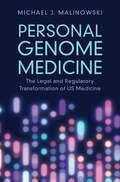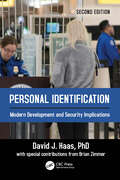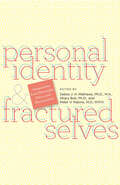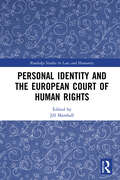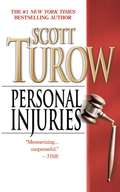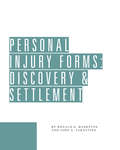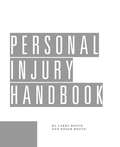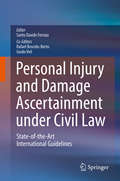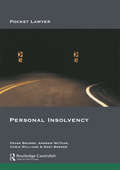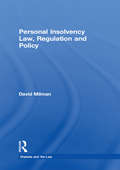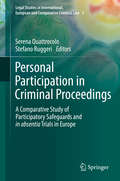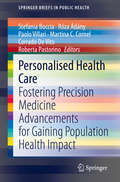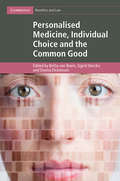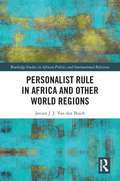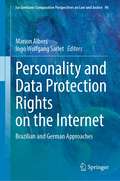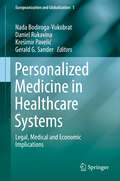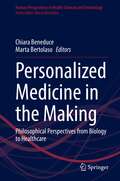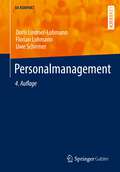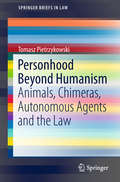- Table View
- List View
Personal Debt in Europe: The EU Financial Market and Consumer Insolvency
by Daniela Vandone Federico FerrettiPersonal debt remains an important factor in many economic models because it encourages people to use debt to finance consumption. Whether this model is sustainable for individuals or the countries in which they reside is an ongoing question of great complexity and many social and economic implications, not only for the burdened individuals and their countries, but also for the EU as a whole. In Personal Debt in Europe, Federico Ferretti and Daniela Vandone examine the 'dark side' of personal debt, or over-indebtedness, in social and economic terms. They employ cross-country consumer-level data to present the latest empirical studies on the problem, analyse these findings to better understand its nature and causes, and discuss the merits of proposed insolvency legislation and harmonisation initiatives in the EU.
Personal Destinies: A Philosophy of Ethical Individualism
by David L. NortonWhat is the meaning of life? Modern professional philosophy has largely renounced the attempt to answer this question and has restricted itself to the pursuit of more esoteric truths. Not so David Norton. <p><p>Following in the footsteps of Plato and Aristotle, Kierkegaard and Nietzsche, Jung and Maslow, he sets forth a distinctive vision of the individual's search for his place in the scheme of things. Norton's theory of individualism is rooted in the eudaimonistic ethics of the Creeks, who viewed each person as innately possessing a unique potential it was his destiny to fulfill. Very much the same idea resurfaced in modern times with the British idealists and Continental existentialists. <p><p>The author reviews these antecedents, showing how his theory differs from those of his predecessors. After a fascinating chapter on "The Stages of Life," Norton shows how the mature consciousness of one's destiny leads to direct, intimate knowledge of other persons, and how this in turn provides the basis for social morality. The conception of justice in which this theory culminates, rooted as it is in essential human differences, provides a challenging alternative to the much-discussed theories of Rawls and Nozick.
Personal Effects
by Marissa PiesmanNina Fischman has dated plenty of life's losers, but she has always steered clear of actual crazed killers. Unfortunately, the same can't be said of Nina's friend Susan, whose habit of making bad choices in the Man Department has turned deadly. Unfortunately, Susan left few clues about her final, fatal date: all Nina knows about him is that he wears contact lenses, likes to hike, and reads the New York magazine personals column. To catch the killer, the cops agree to provide back-up while Nina supplies the bait, in the form of a hike-happy personals ad.
Personal Foul: Coach Joe Moore vs. The University of Notre Dame
by Richard LiebermanIt was bad enough when popular offensive line coach Joe Moore sued the University of Notre Dame for age discrimination--but matters got much worse when the lawsuit uncovered disquieting evidence of unethical and inappropriate conduct in a football program widely regarded as a model of probity. This is the dramatic story of that explosive lawsuit, which tarnished Notre Dame's burnished football image: the winner of eleven national titles; the home of legends Knute Rockne, the Gipper and the Four Horsemen; the subject of innumerable books and films--Notre Dame football has been idealized as everything that is good and right about American sports competition and, indeed, about America itself. This riveting story begins in November 1996, when Bob Davie is hired as head coach to replace the beloved Lou Holtz. In one of his first-and most fateful-executive decisions, Davie fires 64 year old Joe Moore because--as Davie puts it--he needs someone younger for the job. Attorney Rick Lieberman takes on Joe Moore's case and in this absorbing book he describes the trial and the enormous tensions to which litigants like Joe Moore are subject. This is a David and Goliath story in which the Notre Dame attorneys attempt to destroy Joe Moore's reputation as both a coach and a man. In the process, Davie's own background comes under close scrutiny as a reporter's investigation reveals some damning evidence. And as the trial proceeds, Notre Dame's football program is shown to be rife with legal improprieties and inappropriate behavior involving both coaches and administrators. Anyone interested in sports, in the law, in stories of blatant injustice--and in Notre Dame--will find Personal Foul a fascinating, revealing and memorable read.
Personal Genome Medicine: The Legal and Regulatory Transformation of US Medicine
by Michael J. MalinowskiIn the years following FDA approval of direct-to-consumer, genetic-health-risk testing, millions of people in the United States have sent their DNA to companies to receive personal genetic health risk information without physician or other learned medical professional involvement. In Personal Genome Medicine, Michael J. Malinowski examines the ethical, legal, and social implications of this development. Drawing from the past and present of medicine in the U.S., Malinowski applies law, policy, public and private sector practices, and governing norms to analyze the commercial personal genome sequencing and testing sectors and to assess their impact on the future of U.S. medicine. Written in relatable and accessible language, the book also proposes regulatory reforms for government and medical professionals that will enable technological advancements while maintaining personal and public health standards.
Personal Identification: Modern Development and Security Implications
by David J. HaasPersonal Identification: Modern Development and Security Implications, Second Edition explains how personal identification – and REAL ID – became part of the American fabric along with their past century’s historical ID development. The development of the “trusted and secure” personal identification documents began with passports and has continued as social changes made IDs more essential. This book describes the convergence of technologies and hundreds of patents that produced our “trusted and secure” documents and IDs from our past right up through to today.Key factors, that created today’s need for public-issued mass ID, are addressed: Chronicles the effects of large and mobile populations beginning a century ago Chronicles the effects of “impersonal” electronic & computer communications at a distance, and not face-to-face The distribution of services and money by government agencies based on a person’s identity – including “age” and “group” criteria Describes recent national security and terrorism concerns that necessitates the need to know: “You are who you say you are.” Personal identification documents (IDs) and the societal need for “trusted” identification by the public is a relatively new social phenomenon. In 1900, most people did not need or have any IDs until passports, with a photograph of the individual, became mandatory when Great Britain entered World War I in 1914. In the United States, the State-issued driver’s license is probably the only trusted ID in one’s wallet today, but they became “trusted and secure” documents only recently with the requirement for REAL ID. With the first photo driver’s license issued by the State of Colorado in 1959, it took until 1984 for the last State (New York, 25 years later) to comply.As a direct result of 9/11, where terrorists used fake driver’s licenses to board planes, Congress passed the Real ID Act in 2005 to make all State-issued driver’s licenses more trusted, uniform, and tamper-resistant – what is now called the Enhanced Driver’s License with non-drivers being issued Enhanced Identification Cards. And with this, every US citizen can now possess a trusted and secure personal identification document.Personal Identification, Second Edition chronicles the path of personal identification measures – including the latest developments of Real ID. Scholars and professional security managers understand that stability, security, and safety necessitate these identity measures to ensure a safer America. The book explains the various stages and advances, providing readers with a unique study of this fascinating history of the relationship between identity and the means by which one validates and proves their own identity. The enactment of the REAL ID Act of 2005, with more secure and tamper-resistant documents for each citizen of the United States, is being instituted so that one can trust: “you are who you say you are.” The State-issued driver’s license is not a National ID Card – it is a Nationally Recognized ID for each citizen.
Personal Identity and Fractured Selves: Perspectives from Philosophy, Ethics, and Neuroscience
by Debra J. H. Mathews, Hilary Bok, and Peter V. RabinsThis book brings together some of the best minds in neurology and philosophy to discuss the concept of personal identity and the moral dimensions of treating brain disease and injury. The contributors engage a crucial question: When an individual’s personality changes radically because of disease or injury, should this changed individual be treated as the same person?Rapid advances in brain science are expanding knowledge of human memory, emotion, and cognition and pointing the way toward new approaches for the prevention and treatment of devastating illnesses and disabilities. Through case studies of Alzheimer disease, frontotemporal dementia, deep brain stimulation, and steroid psychosis, the contributors highlight relevant ethical and social concerns that clinicians, researchers, and ethicists are likely to encounter. Personal Identity and Fractured Selves represents the first formal collaboration between the Brain Sciences Institute and the Berman Institute of Bioethics, both at the Johns Hopkins University. The book asks neuroscientists and philosophers to address important questions on the topic of personal identity in an effort to engage both fields in fruitful conversation. Contributors: Samuel Barondes, M.D., University of California, San Francisco; David M. Blass, M.D., Johns Hopkins University School of Medicine; Patrick Duggan, A.B., Johns Hopkins Berman Institute of Bioethics; Ruth R. Faden, Ph.D., M.P.H., Johns Hopkins Berman Institute of Bioethics; Michael S. Gazzaniga, Ph.D., University of California, Santa Barbara; Guy M. McKhann, M.D., Johns Hopkins University School of Medicine; John Perry, Ph.D., Stanford University; Carol Rovane, Ph.D., Columbia University; Alan Regenberg, M.Be., Johns Hopkins Berman Institute of Bioethics; Marya Schechtman, Ph.D., University of Illinois at Chicago; Maura Tumulty, Ph.D., Colgate University
Personal Identity and the European Court of Human Rights (Routledge Studies in Law and Humanity)
by Jill MarshallIn this new and burgeoning field in legal and human rights thought, this edited collection explores, by reference to applied philosophy and case law, how the European Court of Human Rights (ECtHR) has developed and presented a right to personal identity, largely through interpretation of Article 8 of the European Convention on Human Rights. Divided into three parts, the collection interrogates: firstly, the construction of personal identity rights at the ECtHR; secondly, whose identity rights are protected; and thirdly, the limits of identity rights. The collection is the first in the Routledge Studies in Law and Humanity series. Contributions from nine leading and emerging legal scholars from the UK, Ireland and continental Europe explore how the right has developed, rights to identity and marriage, LGBTI+, persons with disabilities, religious and cultural issues and critical perspectives on the social construction and framing of the right. The collection is primarily aimed at scholars and advanced students, particularly of human rights law and its theory, Jurisprudence and Philosophy of Law, and those interested in ECtHR jurisprudence, and those interested in the connection between theories of inclusion, belonging and rights, including human rights lawyers.
Personal Injuries
by Scott TurowA compelling and convincing account of a long-term government-run sting operation.
Personal Injury Forms: Discovery & Settlement
by John Tarantino Ronald BankstronKeep your cases moving forward. Establishing proven routines for processing your tort cases can boost your efficiency and your effectiveness. Tools for systematizing your caseload may be found in Ron Bankston and John Tarantino's Personal Injury Forms: Discovery & Settlement. Faster Settlements This book and disc package offers time-tested forms and advice on how to use them. The first half of the book focuses on tools applicable to all types of personal injury litigation; the second half covers the following types of cases: Auto accidents Insurance bad faith Liquor liability Medical malpractice Police assault & battery Premises security Products liability Slip & fall Workers' compensation And more In personal injury litigation, mismanagement and inefficiency often plague the early phases of case development. Over 300 carefully selected forms, checklists, questionnaires, complaints, and memoranda will help you organize and economize your personal injury work. Improve the speed and effectiveness of your intake, investigation, pleading, discovery, and settlement with these practice-proven tools: Model interrogatories Deposition checklists Interview questionnaires Case evaluation checklists Client, witness and expert letters Sample complaints Memoranda Motions Settlement letters The authors' years of experience have yielded practical advice and techniques for overcoming common problems. Troublesome issues are analyzed with case authority, and case-specific liability hurdles are tackled. The following are just a few of the helpful tips you will learn from Personal Injury Forms: How to spot clients who are likely to be difficult ... before they cause you problems. Section 115 Understanding which cases not to accept. Section 116 Discovery motions help you move around common obstacles. Section 753 How to refute defense claims of malingering. Section 118 Model client letters and attachments, like a "what to expect" letter with a special damages record, improve client communication and encourage client assistance. Section 133 Keep your cases moving forward. Establishing proven routines for processing your tort cases can boost your efficiency and your effectiveness. Tools for systematizing your caseload may be found in Ron Bankston and John Tarantino's Personal Injury Forms: Discovery & Settlement.
Personal Injury Handbook
by Larry BoothPersonal Injury Handbook As insurers grow more miserly, it is more important than ever to carefully select, investigate, prepare, and prosecute your cases. Larry and Roger Booth's Personal Injury Handbook is loaded with valuable practice aids and tips that will help you maximize the value of each of your cases. You receive over 140 forms and 60 checklists specific to 14 types of cases: * Motor vehicle accidents * Railroad crossing accidents * Premises liability * Premises security * Construction site accidents * Electrocution accidents * Dog bites * Collisions with livestock * Products liability * Auto crashworthiness * Medical malpractice * Sexual molestation * Insurance bad faith * Industrial equipment
Personal Injury and Damage Ascertainment under Civil Law
by Guido Viel Rafael Boscolo-Berto Santo Davide FerraraThis volume serves to provide an international overview of personal injury compensation in different geographical areas (15 countries already included), with a special focus on the methods used to ascertain the injury and the related damages. It also goes on to clarify the logical and methodological steps required for a sequential, in-depth ascertainment of any traumatic event and the related personal damage, both pecuniary and non-pecuniary. Personal injury is a legal term for an injury to thebody, mind or emotions suffered by the plaintiff under tort and/or civil lawregulations. Damages related to the injury can be pecuniary or non-pecuniary innature. Although several comparative studies and research projects on tort andcivil law and personal injury claims aimed at developing new tools forpromoting harmonization of private law have been performed at an internationallevel, heterogeneity and divergences still exist in the definition andcompensation of personal injury and damage across different national legislativesystems. The starting point for any awarding procedure should be a medical, or rather amedico-legal, assessment to gain evidence on the trauma or event causing theinjury, the mechanism of injury, the pre-existing health status of the injuredparty, and the health consequences of the injury (temporary and permanentimpairment, work incapacity, etc. ). In order to pursue the ultimate goal of aninternational harmonization of personal injury compensation, it is of upmostimportance to define the quality requirements for the medico-legalascertainment methodology, which are essential for guaranteeing theobjectivity, rigor, and reproducibility of the data and the evidence collectionprocedure. Currently, there are no supra-national medico-legal guidelines dealingwith the ascertainment methodology of personal injury and damage under tort andcivil law.
Personal Insolvency
by Frank BrumbyThe Pocket Lawyer series is designed for members of the public who want 'how to' guidance in situations that would normally require expert advice.Each title: written by experts in their field contains all the information you need in one book has an accessible and user-friendly layout and structure is supported by a companion website providing free updates and ready-to-use documents and letters
Personal Insolvency Law, Regulation and Policy (Markets and the Law)
by David MilmanAs the radical reforms contained in the Enterprise Act 2002 have come fully on-stream, Personal Insolvency Law has become a major focus of attention. At the same time, all evidence points to increasing levels of personal debt with the consequential rise in bankruptcies. Personal Insolvency Law, Regulation and Policy therefore provides a timely evaluation of the current state of English law in this important area. The volume presents a critical analysis of the regimes of bankruptcy and individual voluntary arrangement in the context of current policy goals. It examines the impact of the Insolvency Act 2000 and the Enterprise Act 2002, and discusses the treatment of bankruptcy within the global economy. The book will be a valuable guide for students and academics engaged in the study of this increasingly important branch of private law. The study will also be of value to practitioners and policy makers.
Personal Law
by Eric L. RichardsInformative overview of personal law issues that are of practical importance in our lives.
Personal Participation in Criminal Proceedings: A Comparative Study of Participatory Safeguards and in absentia Trials in Europe (Legal Studies in International, European and Comparative Criminal Law #2)
by Stefano Ruggeri Serena QuattrocoloThis book presents a comprehensive analysis of personal participation in criminal proceedings and in absentia trials. Going beyond the accused-centred perspective of default proceedings, it not only examines the consequences of absence in various types of criminal proceedings, but also the fair trial safeguards allowing personal contributions during trials, as well as in pre-trial inquiries, higher instances and transborder procedures. By pursuing an interdisciplinary approach and employing comparative-law methodologies, the book presents a cross-section of twelve European criminal justice systems with regard to the requirements set forth by constitutional, international and EU law.
Personal Security: A Guide for International Travelers
by Tanya SpencerMaintain peace of mind while you are working or living abroad wherever and however you travel. As an international traveler, you know there are risks. But are you doing everything you can to protect yourself and your belongings? Whether you are traveling for work or pleasure, Personal Security: A Guide for International Travelers enables you to pre
Personalised Health Care: Fostering Precision Medicine Advancements for Gaining Population Health Impact (SpringerBriefs in Public Health)
by Stefania Boccia Paolo Villari Róza Ádány Martina C. Cornel Corrado De Vito Roberta PastorinoPractitioners are increasingly adopting a personalised medicine approach to individually tailored patient care, especially disease diagnosis and treatment with the use of biomarkers. However, development and implementation of such approaches to chronic disease prevention need further investigation and concerted efforts for proper use in healthcare systems. This book provides high-quality, multidisciplinary knowledge from research in personalised medicine, specifically personalised prevention of chronic disease. It addresses different perspectives of prevention in the field, and is the outcome of a four-year work of the Personalized prevention of Chronic Disease (PRECeDI) Consortium, a multi-disciplinary and multi-professional team of experts. The Consortium jointly agreed to document and address the five aspects or domains of personalised medicine and prevention as individual chapters: Identification of biomarkers for the prevention of chronic diseaseEvaluation of predictive genomic applicationsEthico-legal and policy issues surrounding personalised medicineRoles and responsibilities of stakeholders in informing healthy individuals on their genome: a sociotechnical analysisIdentification of organisational models for the provision of predictive genomic applicationsThe book focuses on the Consortium's recommendations that are derived from each of these domains based on up-to-date evidence and research that the authors write, follow, and systematically organise and report.Personalisation of health care is, eventually, a driver of innovation in research and healthcare systems. With this SpringerBrief on Personalised Health Care: Fostering Precision Medicine Advancements for Gaining Population Health Impact, the Consortium provides further evidence of the clinical validity and utility of personalised medicine with special emphasis on the prevention of chronic diseases. The book is a useful resource for policy makers, industry and healthcare professionals, scientists, technology-sector professionals, investors, citizens, and private companies that need proper advice to realise the potential of personalised medicine.
Personalised Medicine, Individual Choice and the Common Good (Cambridge Bioethics and Law)
by Donna Dickenson Sigrid Sterckx Britta Van BeersHippocrates famously advised doctors 'it is far more important to know what person the disease has than what disease the person has'. Yet 2,500 years later, 'personalised medicine', based on individual genetic profiling and the achievements of genomic research, claims to be revolutionary. In this book, experts from a wide range of disciplines critically examine this claim. They expand the discussion of personalised medicine beyond its usual scope to include many other highly topical issues, including: human nuclear genome transfer ('three-parent IVF'), stem cell-derived gametes, private umbilical cord blood banking, international trade in human organs, biobanks such as the US Precision Medicine Initiative, direct-to-consumer genetic testing, health and fitness self-monitoring. Although these technologies often prioritise individual choice, the original ideal of genomic research saw the human genome as 'the common heritage of humanity'. The authors question whether personalised medicine actually threatens this conception of the common good.
Personalist Rule in Africa and Other World Regions (Routledge Studies in African Politics and International Relations)
by Jeroen J.J. Van den BoschThis book presents an innovative model linking insights from democratization, development and conflict studies to explain personalist behavior and their violent transitions. Based on multiple case studies from Sub Saharan Africa, the author maps and predicts regime transitions, presenting examples of how states can avoid such vicious circles of conflict and tyranny. By integrating decades of specialist literature from various subfields of political science, the book models personalist behavior, its impact on the states they govern, and their future transitions. By systematizing regime behavior (coup-proofing, gatekeeping, repression and hoarding), the model identifies the mechanics on how personalist regimes establish vicious circles of personalism and explains how exactly they end up again in authoritarianism or in new personalist tyrannies after their demise, and so seldom transition to democracy. This book will be of key interest to scholars and students of African politics, democratization and democratic consolidation, authoritarian rule and more broadly to political science, comparative politics, area studies, political leadership, peace and conflict studies and development studies.
Personality and Data Protection Rights on the Internet: Brazilian and German Approaches (Ius Gentium: Comparative Perspectives on Law and Justice #96)
by Marion Albers Ingo Wolfgang SarletThis book focuses on protection needs and new aspects of personality and data protection rights on the Internet, presenting a comprehensive review that discusses and compares international, European and national (Brazilian, German, Pakistani) perspectives. It deals with overarching questions, such as whether universal minimum standards of privacy protection can be developed or how regional data protection rights can be safeguarded and enforced extraterritorially, given the conditions of the Internet. Furthermore, the book addresses new challenges and novel rights, e. g., data retention and protection against mass surveillance, the right to be forgotten, rights to anonymity, legal issues of the digital estate or rights relating to algorithmic decision-making. Furthermore, the book explores how well-known paradigms, such as liability for personality rights violations or damages, have to be adapted in view of the significant role of intermediaries.
Personalized Medicine in Healthcare Systems: Legal, Medical and Economic Implications (Europeanization and Globalization #5)
by Nada Bodiroga-Vukobrat Daniel Rukavina Krešimir Pavelić Gerald G. SanderThis book gathers scientific contributions on comprehensive approaches to personalized medicine. In a systematic and clear manner, it provides extensive information on the methodological, technological, and clinical aspects of high-throughput analytics, nanotechnology approaches, microbiota/human interactions, in-vitro fertilization and preimplantation, and various diseases like cancer.Moreover, the book analyzes the social and legal aspects of social security systems, healthcare systems and EU law – e.g. the role of solidarity, regulatory possibilities and obstacles, justice and equality, privacy/disclosure of data, and the right to know – from an interdisciplinary perspective. Lastly, it explores the economical and ethical context in the fields of business models, intellectual property issues, the patient/physician relationship, and price discrimination.
Personalized Medicine in the Making: Philosophical Perspectives from Biology to Healthcare (Human Perspectives in Health Sciences and Technology #3)
by Marta Bertolaso Chiara BeneduceThis book offers a multidisciplinary look at the much-debated concept of “personalized medicine”. By combining a humanistic and a scientific approach, the book builds up a multidimensional way to understand the limits and potentialities of a personalized approach in medicine and healthcare. The book reflects on personalized medicine and complex diseases, the relationship between personalized medicine and the new bio-technologies, personalized medicine and personalized nutrition, and on some ethical, political, economic, and social implications of personalized medicine. This volume is of interest to researchers from several disciplines including philosophy, bio-medicine, and the social sciences.
Personalmanagement: Handlungsmaßnahmen Und Best Practices Zum Demografieorientierten Personalmanagement (BA KOMPAKT)
by Uwe Schirmer Doris Lindner-Lohmann Florian LohmannDas vorliegende Personal-Lehrbuch bietet einen Einblick in die zentralen Aufgabenfelder eines modernen Personalmanagements sowie einen umfangreichen Überblick über vertiefende Literatur zu spezifischen Themenbereichen. Ausgehend von den grundsätzlichen Zielen und Aufgaben des Personalmanagements sowie den aktuellen Tendenzen in der Personalpolitik behandeln die Autoren Personalbedarfsplanung, -beschaffung, -einsatz und -verwaltung, Entlohnung und Sozialpolitik, Personalentwicklung, -abbau und -controlling. Das Lehrbuch ist genau auf die Anforderungen (Kompetenzziele, Lehrinhalte) des Bachelor-Studiums im Studienbereich Wirtschaft der Berufsakademien und Dualen Hochschulen zugeschnitten sowie für alle betriebswirtschaftlichen Bachelorstudiengänge als Einführung für das Fach Personalmanagement geeignet. Eine Vielzahl von Abbildungen, Hintergrundinformationen und Praxisbeispielen tragen zu einer hohen Verständlichkeit der behandelten Themenfelder bei. Die enthaltenen Kontrollfragen bieten dem Leser die Möglichkeit, das eigene Verständnis direkt zu überprüfen.Für die 4. Auflage wurde das Buch ein Kapitel zum Thema Personalorganisation erweitert.
Personhood Beyond Humanism: Animals, Chimeras, Autonomous Agents And The Law (SpringerBriefs in Law)
by Tomasz PietrzykowskiThis book explores the legal conception of personhood in the context of contemporary challenges, such as the status of non-human animals, human-animal biological mixtures, cyborgisation of the human body, or developing technologies based on artificial autonomic agents. It reveals the humanistic assumptions underlying the legal approach to personhood and examines the extent to which they are undermined by current and imminent scientific and technological advances. Further, the book outlines an original conception of non-personal subjecthood so as to provide adequate normative solutions for the problematic status of sentient animals and other kinds of entities. Arguably, non-personal subjects of law should be regarded as holding one right, and only one right - the right to be taken into account.




